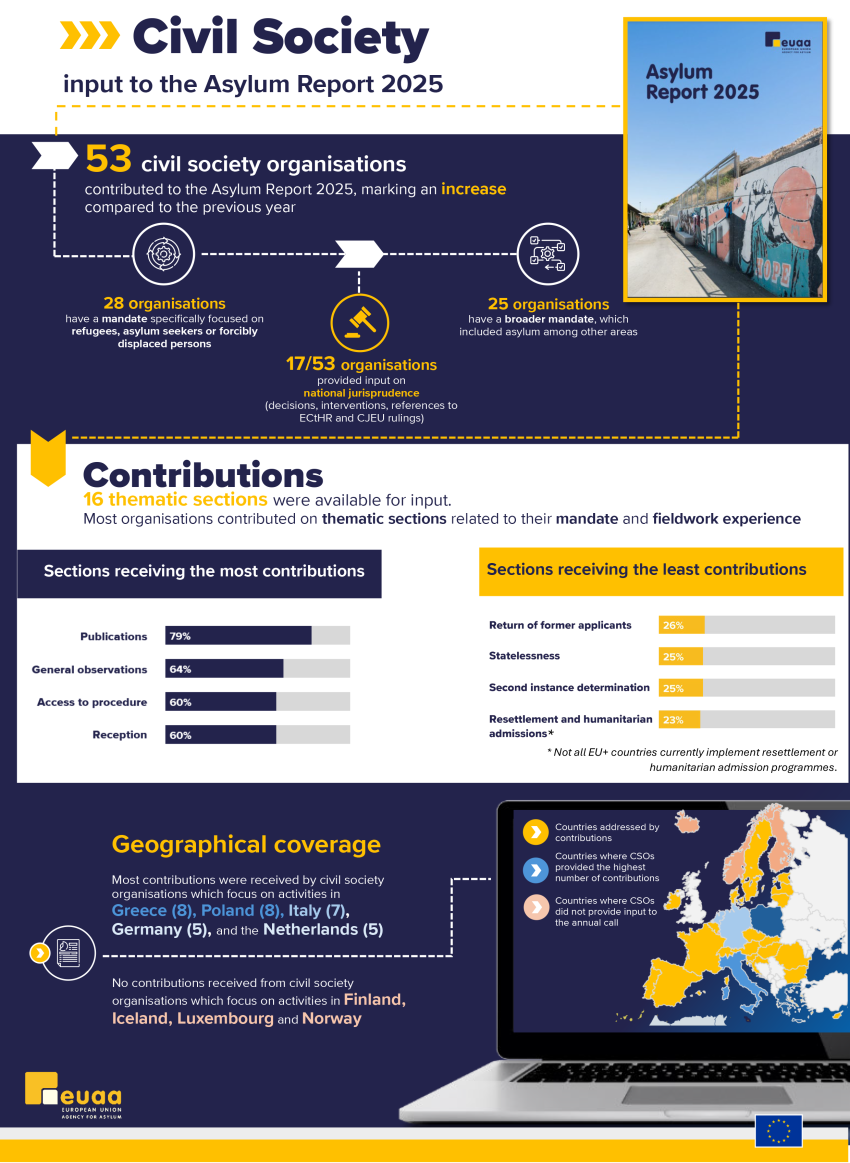Civil society organisations play an important role in the debate on and implementation of asylum policy. Their specific expertise and knowledge is synergetic and is often of added-value to the Agency’s work. The EUAA is committed to maintaining a close dialogue with relevant civil society organisations and competent bodies active in the field of asylum and reception.
The Consultative Forum
The Consultative Forum is the Agency’s main channel for cooperation with civil society. Cooperation between the Agency and civil society is defined in Article 50 of the EUAA Regulation, which calls upon the Agency to maintain a close dialogue with relevant civil society organisations and competent bodies and to set up a Consultative Forum to that purpose as mechanism for the exchange of information and the sharing of knowledge.
The Consultative Forum was initially established in 2011 as part of the European Asylum Support Office and has subsequently been re-constituted under the EUAA in a revised format and with a reinforced mandate.
Management Board Decision No 111 establishes the Consultative Forum under the EUAA and sets out the rules regarding its composition and conditions for transmitting information thereto. The Management Board Decision will, in due time, be complemented by the working methods, which are to be established by the Consultative Forum itself.
Who can become a member of the EUAA Consultative Forum?
In accordance with the EUAA Regulation and the MB Decision No 111, the Fundamental Rights Agency, the European Border and Coast Guard Agency, and UNHCR are members of the EUAA Consultative Forum, having accepted the invitation. The Consultative Forum is further open for participation by relevant civil society organisations and competent bodies operating in the field of asylum policy at local, regional, national, Union or international level – provided they meet the conditions as set out in Annex 1 of MB Decision No 111. Following an open call for expressions of interest, the below organisations are currently members of the EUAA Consultative Forum.
How to become a member of the EUAA Consultative Forum?
The call for expressions of interest from relevant civil society organisations and bodies to become members of the EUAA Consultative Forum remains open indefinitely. Should you be interested to join the Consultative Forum, here is what you should do:
- Complete the online expression of interest form
- Sign and submit via e-mail the:
- confidentiality agreement;
- declaration of interest (organisations and bodies)
- declaration of interest (personal capacity)
Contact
For any queries, please contact: consultative-forum@euaa.europa.eu
The production of the Asylum Report 2026 is currently underway. We invite you, our partners from civil society organisations, academia and research institutions, to contribute to this year’s edition.
To do so, please use the online form to submit your contributions on developments in asylum law, policy or practices in 2025:
Background
As an independent centre of expertise on asylum, the EU Agency for Asylum (EUAA) produces the annual Asylum Report, which is the Agency’s flagship report, presenting an overview of developments in the field of international protection in Europe. The report includes information and perspectives from various stakeholders, including experts from EU+ countries, civil society organisations, researchers, and UNHCR.
Last year, 53 civil society organisations and research institutions provided contributions to the Asylum Report, adding to the diversity of perspectives presented in the report.

Input from Civil Society to the Asylum Report 2025
- Aditus foundation
- Arca di Noè Società Cooperativa Sociale
- Association for Juridical Studies on Immigration (ASGI)
- AsyLex
- Asylos
- Austrian Red Cross -ACCORD
- Border Violence Monitoring Network (BVMN)
- Center for Legal Aid -Voice in Bulgaria
- Centre for Research on Migration, Refugees and Belonging, University of East London
- Centre of Migration Research, University of Warsaw
- Comisión Española de Ayuda al Refugiado (CEAR) | Spanish Commission for Refugees
- Convive - Fundación Cepaim
- Council of Bars and Law Societies of Europe (CCBE)
- Council of Europe, Human Rights Education for Legal Professionals (HELP) Programme
- CSO I want to help refugees
- Danish Refugee Council
- Depaul Ireland
- Dutch Advisory Council on Migration
- Equal Legal Aid
- European Council on Refugees and Exiles (ECRE)
- European Network on Statelessness
- Fenix Humanitarian Legal Aid
- Flüchtlingsrat Niedersachsen e.V.
- Forum Réfugiés
- France terre d'asile
- Greek Council for Refugees
- Group for the Abolition of Female Genital Mutilation (GAMS Belgium)
- Helsinki Foundation for Human Rights
- Hungarian Helsinki Committee (publications)
- International Catholic Migration Commission (ICMC) & Share Network
- International Rescue Committee
- Irish Refugee Council
- Jesuit Refugee Service (JRS) Europe
- Kids in Need of Defence
- Lithuanian Red Cross Society
- Macedonian Young Lawyers Association
- Mobile Info Team
- Network for Children’s Rights
- Organisation for Aid to Refugees (OPU)
- Österreichischer Rechtsanwaltskammertag (ÖRAK)
- Portuguese Refugee Council
- Refugee Council of Lithuania
- Safe Passage International
- Santa Casa da Misericórdia de Lisboa
- Save the Children
- Save the Children Romania (Salvați Copiii)
- Slovak National Centre for Human Rights
- Stichting Gave
- Stichting Nidos
- Swedish Federation for Lesbian, Gay, Bisexual, Transgender, Queer and Intersex Rights & Queer Youth Sweden (joint submission)
- Swedish Network of Refugee Support Groups (FARR)
- Swedish Refugee Law Center
- Swiss Refugee Council (OSAR)
- Consultative Forum Working Methods
- Thematic Consultation Group on COI Working Methods
- Thematic Consultation Group on Persons in a Vulnerable Situation Working Methods

